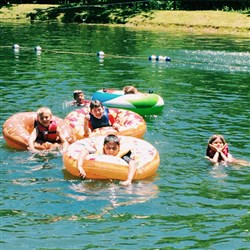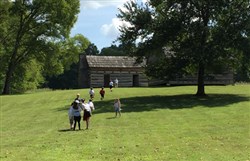VOL. 43 | NO. 11 | Friday, March 15, 2019
Choosing their own path
By Hollie Deese
Many children today don’t have much to say about how their days are structured. Aside from a strict school schedule, most of their activities are dictated, scheduled and organized by their parents.
But at some area summer camps, children are taking control of their schedule, and the benefits are broader than spending time away from technology.
At Whippoorwill Farm Day Camp, for example, there is programming for children in first through 11th grades, with many of the sessions already sold out – some within hours. The draw says Shanelle Lambert-Rauh, executive director, is the decision-making ability that is taken off parents and put onto the campers.
“The kids get to design and decide for themselves what they’re going to do each day at camp,” she says.
That means they don’t have a set schedule in which group A goes fishing while group B does crafts. So, if a camper wants to spend the day in the creek, that, in theory, is what they are going to be allowed to do.
“What we hear from our families is that the kids just love Whippoorwill because they get to do what they want to do and spend their days the way that they want to spend them,” Lambert-Rauh adds. “They don’t have to do craft time if they’re not crafty people or they don’t have to go to archery if they don’t want to do archery. It’s a unique program.”
Discipline issue are few, Lambert-Rauh says, because children are happy and want to be there.

Want to spend the day swimming? Whippoorwill campers get a say in how they spend their day.
-- Photograph Provided“They’re doing what they want to do, including the staff because the staff are cross-trained, as well. They’re not just hired just to do archery all summer. That would be very boring, even if you love archery. Our staff are trained in 10 to 12 different activities, and their daily schedule rotates around, as well,” she says.
Happy campers means happy parents, Lambert-Rauh says, because they can see their children are excited to get to camp each day. Also, many parents have reported their children demonstrating more confidence.
“They are really able to test those skills and learn for themselves how to make their own decisions, because this generation of kids, we’ve got parents that sometimes like to pick and choose exactly what the kids are going to do,” she says.
“This is putting that control back on the kids. They’ve learned how to come up with second choices because you don’t always get your first choice, and learning that skillset, that autonomy, they’re not necessarily getting at school or at home as much as they could.”
Polly Grammer takes a different approach.
She usually sees 300 equestrian campers each summer at Peach Tree Farms for her horse camp, but this summer will be capping that number at 200. Her youngest group – ages 4-6 – learn how to trot, post and steer on little ponies. Older campers are divided into groups by ability and given a schedule that includes feeding, riding and other care for the horses.
Ultimately, she says it all teaches responsibility for themselves and others. And, that there are consequences for their actions.

This year the Hermitage will offer its first-ever pirate-themed summer camp, exploring the ties between Gen. Andrew Jackson and the privateers who helped him win the Battle of New Orleans. There also will be exploration of the grounds of Jackson’s home and discussions about the different buildings, why they’re important and what purpose they served for the Jacksons.
-- Photograph Provided“They have a schedule, and if they’re supposed to be somewhere at 10:10, then they better be there at 10:10,” Grammar adds. “We make sure they’re very well-rounded. And if we have a kid that doesn’t get along, she has one chance, and then they go home.”
Ahoy matey
Andrew Jackson’s Hermitage is offering camp this summer for the first time in a decade, a pirate-themed adventure that will include solving codes to navigating waterways and a mock battle to showcase how privateers helped Jackson and his militia win the Battle of New Orleans in 1812.
Ann Dee Jones, vice president of marketing and communications at the Hermitage, is new to the staff, along with a new chief of museum operations who oversees the historic home’s education department and public events. “The time is good for us to reassess what we’ve been doing, and our education department is always anxious to continue offering different things for families,’’ she says.
The summer camp will have a cap of 50 students and will be staffed by employees of the Hermitage, who can best tell the history of Jackson and his career as a military hero. That’s the goal of the camp, in addition to getting children outside and away from computer screens
“When they’re out doing the scavenger hunts, we’ll talk about the different buildings that they’re seeing and why they’re important and what kind of purpose they served for the Jacksons,” Jones adds.
Other institutions, especially universities and independent schools, have discovered equally creative ways to attract campers.
Some, such as the Duke TIP program at Belmont, are fun and rigorous with campers forming research teams to solve a made-up crisis that could happen in the real world.
Tennessee State University offers a biotechnology camp for rising 6-8 graders to learn about DNA. Vanderbilt has a summer program for gifted students that also has a science and technology theme.
We Build Tech Camps brings youngsters together with tech professionals, and the subjects include rocketry, Sphero robotics, Dash robotics, Scratch for beginners (computer programming) and more. The camp is presented by the Technology Council and is held at various locations.
While the universities feature many sporting camps for aspiring athletes, the Predators have a summer hockey school for boys and girls with professional staff members. Franklin Road Academy hosts a Titan football camp.
And, for those uninterested in specializing, there’s the YMCA camps and Camp Widjiwagan, Camp Davis at Gordon Jewish Community Center and Camp Marymount, giving Nashville area kids an outdoor camp experience mom or dad may have had back in the day.
Affording camp
There really is a camp for just about every budget because fees to attend camp can vary widely. Resident camp tuition can average $630 to $2,000 a week, the 2018 American Camp Association Business Operations Report states. Day camp tuition ranges from $199 to $800.
The ACA recommends a few different options when planning a camp search and budget. First, look for camp scholarships. The ACA supports camp scholarships indirectly with the Send a Child to Camp fund for campers in need. ACA says always call the camp director directly and ask if financial assistance is available.
Camps offer a variety of special discounts for early registration and multiple enrollments, to late registration to fill an empty spot.
For instance, more than 75 percent of camps award more than $1,000 in discounts annually.
Camps also offer payment plans, and parents shouldn’t assume their income doesn’t qualify. More than 93 percent of camps offer financial assistance, and 67 percent of camps award $10,000 or more in scholarships annually. Ask the camp what payment or assistance program is offered.
If the camp can’t help, parents can look for assistance offered by other organizations, including churches and other places of worship. If the camper’s immediate family served or are serving in the military, there may be funds available there, too. Other civic organizations and clubs may also have available funds.
Some camps also participate in income-eligible subsidy programs, and there are some tax breaks available for day camps for qualified dependents that are necessary to allow parents to work, look for work or to attend school full time.